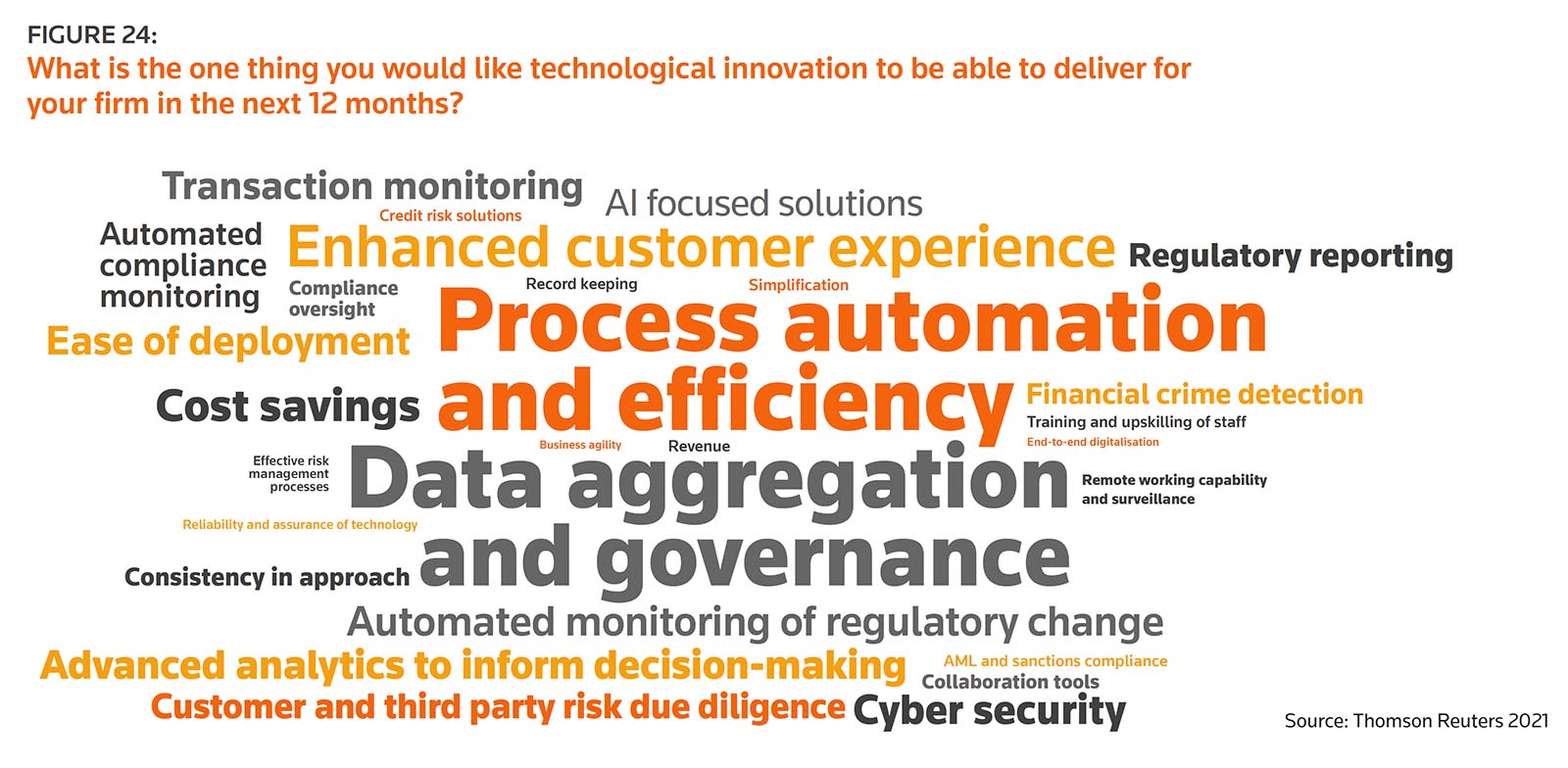In the latest report on fintech, regtech & the role of compliance, we explore how digital transformation and new technology solutions can challenge financial services firms’ corporate governance and risk management operations
Digital transformation has been a fundamental enabler for financial services firms. It is hard to underestimate the opportunities that these firms can derive from the implementation of technological solutions; however, maximizing the potential of these tech solutions can present challenges.
In Thomson Reuters Regulatory Intelligence’s sixth annual survey and report on fintech, regtech and the role of compliance, we explore these challenges, particularly in the context of financial services firms’ corporate governance and risk management operations.
The most significant challenges highlighted by respondents to this year’s survey concern data, operational resilience, the management of third parties, and skill sets.
-
-
- Data — Data is the strategic asset of the digital age, and firms need to embed data governance frameworks as a core competency within their corporate governance arrangements.
- Operational resilience — Digital solutions, which at times may operate critical business functions, must be resilient to any disruption. Also, risk and compliance applications must be able to accommodate any shift to alternative working patterns.
- Third parties — Third parties are crucial to the development of many fintech applications. And outsourcing or third-party arrangements need to be part of financial services firms’ risk management infrastructure.
- Skill sets — Firms need to invest in more specialist technological skills, although determining what those skills should be is a challenge in its own right.
-

A thread which runs throughout the report is that of data, and the need for a stronger focus on all elements of data governance. The size of the issue is not to be downplayed. It is estimated that every person online produced 1.7 MB of data every second in 2020, amounting to 1.145 billion gigabytes of data per day. The world produced twice as much data in 2021 as it did in 2019, and this level is predicted to increase exponentially over the next five to 10 years.

Financial services firms need to embrace the fact that data is a vital strategic asset, and from there, build a business-wide approach to data aggregation, management, storage, security, retrieval, and destruction. In other words, financial services firms should construct a business-specific approach to data governance. The successful governance of data will have multiple benefits for firms, including greater line of sight to risks being run in a hybrid working environment and enhanced recordkeeping.

Data governance and cyber resilience were considered to be the main areas where additional regulation and guidance was needed, according to survey respondents. This was mirrored by respondents’ feedback concerning what they expect to be the greatest financial technology challenges their firms will face in the next 12 months, which were data governance, availability of skills, cyber resilience, and regulatory approach.
Establishing a strong compliance function
The establishment of a well-resourced compliance function that can successfully navigate the use of digital solutions will be one of the best investments a financial services firm can make. The governance of vast quantities of data, alongside regulatory change, increasing cyber risk and threats from Big Tech, is certain to drive more widespread use of technological solutions in the coming years. That said, to deliver on data governance, firms will need to invest wisely in both skills and infrastructure — while re-assessing their priorities in a (post-) pandemic world.
You can download a full copy the “2022 Fintech, regtech & the role of compliance” report here.
Our annual survey on the roles of fintech, regtech and compliance among financial services firms has, in its lifetime, attracted more than 2,500 respondents. Almost 450 respondents from all sectors of financial services — from globally significant financial institutions to technology start-ups — took part in this latest survey. The survey results are intended to help financial services firms with planning, resourcing, and determining direction, allowing firms to benchmark whether their approach, skills, strategy, and expectations are in line with those of the wider financial services industry.
Further, the latest survey looks at how fintech was used in 2021 and is expected to be used in 2022 while providing a snapshot of the marketplace. This year, new questions have been included in the survey to better explore how firms and their compliance functions use technology, and how they would like to be able to use it. New questions assess the relationship between firms and regulators when it comes to technology, and what good is beginning to look like for the regulation of fintech and regtech. Here, respondents reported that the hallmark of good regulation was the regular interaction between regulator and industry, although many respondents also issued a plea for greater international coherence in terms of the regulatory approach to both regtech and fintech.
The report assesses the extent to which financial services firms are turning the technological challenges they face into opportunities, embracing the new ways of working and navigating the evolving regulatory approach.
The report also homes in on areas that directly affect the compliance function and where permission was received, quotes (some anonymized) from respondents have been included where they highlight specific issues.
For more on the report, you can listen to Episode 10 of Season 3 of the “Compliance Clarified” podcast, which features a discussion by the authors of the report. And click here for further information on Thomson Reuters Regulatory Intelligence.







